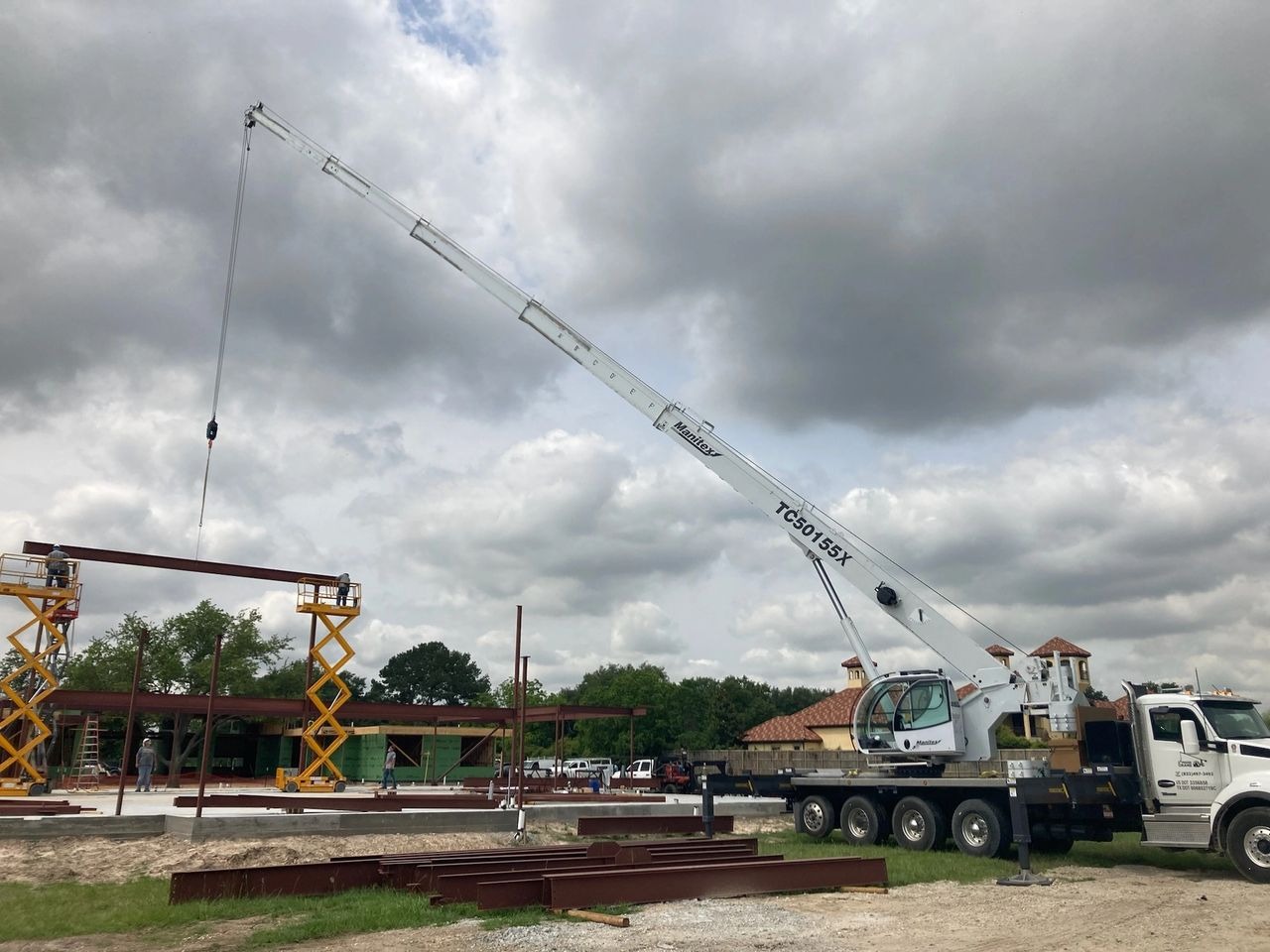Understand the Different Types of Cranes
If you’re in the construction or manufacturing industry, chances are you’ve had to use cranes at some point. A crane is an essential piece of equipment, commonly used for lifting and moving heavy objects.
Not all cranes are created equal. Depending on the job at hand, certain types of cranes may be more suitable than others.
Before selecting the right crane for your specific job, it’s essential to understand the different types of cranes. This knowledge will help you determine which crane is best suited for your unique situation.
Different Types of Cranes for Different Jobs
1. Mobile Cranes
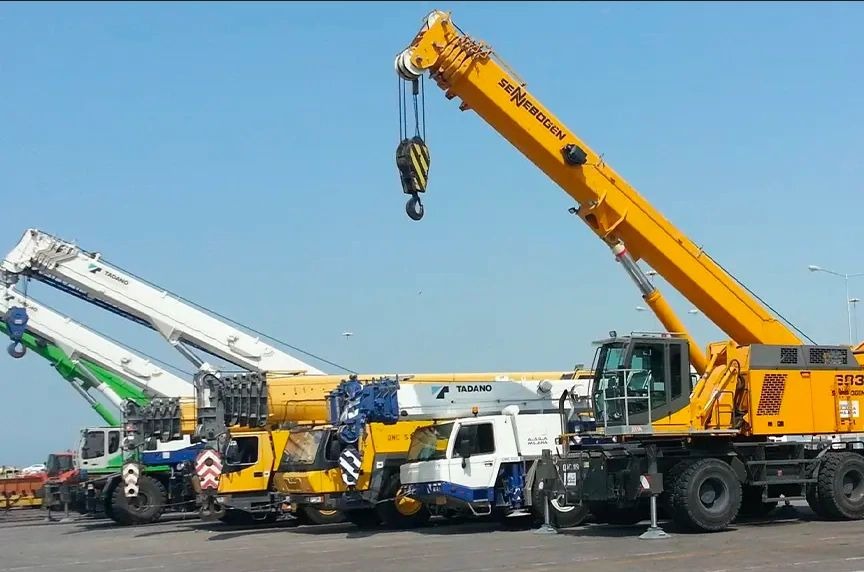
A mobile crane is the most commonly used type of crane. It is versatile and can be easily transported from one location to another.
They consist of a telescopic boom mounted on a mobile platform. This makes them ideal for jobs that require flexibility with quick set-up times.
Jobs Where Mobile Cranes Are Typically Used:
- Short-term construction
- Transporting heavy equipment
- Bridge building and repair
- Loading and unloading
- Roofing and HVAC installation
2. Tower Cranes

A tower crane is a tall, fixed-construction crane with a long horizontal jib that rotates around a central mast. Tower cranes are designed to lift heavy materials and move them horizontally across a site.
They are commonly used for taller construction and can reach heights of over 1,000 feet. With their ability to lift and position hefty items with precision, tower cranes play an integral role in the construction of skyscrapers and other significant structures.
What Tower Cranes Are Often Used For:
- High-rise building construction
- Skyscraper construction
- Bridge and dam building
- Large-scale infrastructure projects
3. Hydraulic Cranes
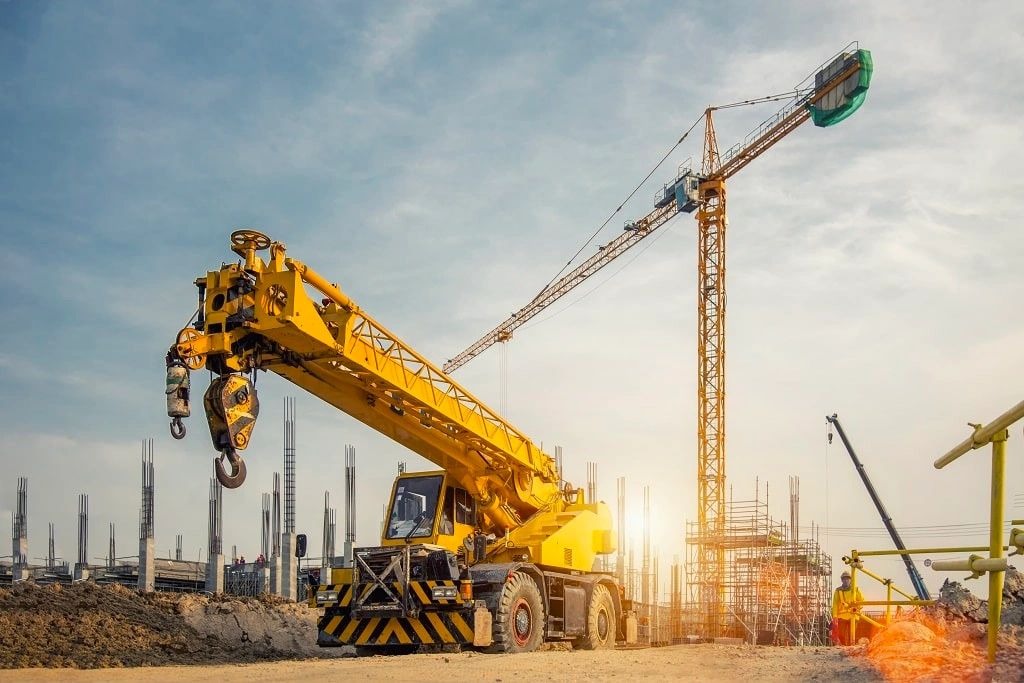
Hydraulic cranes use fluid pressure to lift and maneuver heavy loads. The hydraulic system provides precise movements. This makes them ideal for tasks that necessitate delicate handling of materials.
These types of cranes perform exceptionally well on a construction site that demands heavy lifting. Hydraulic cranes are known for their stability and are capable of lifting thousands of pounds with ease.
Common Uses for Hydraulic Cranes:
- Heavy lifting in small spaces
- Moving heavy machinery
- Lifting materials for high-rise construction
- Loading/unloading shipments at docks
- Installing large signs or billboards
4. Telescopic Cranes
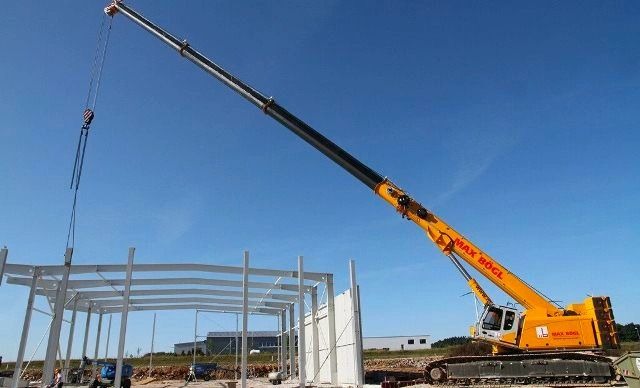
Telescopic cranes are equipped with a telescopic boom. They are versatile and can lift heavy loads at varying heights. Telescopic cranes are also known as boom trucks. They have an extendable arm that can be fitted with various attachments such as a hook or winch for different jobs.
These cranes are often used in industries that require lifting objects to great heights or reaching over obstacles. Their compact size and mobility make them popular for tight spaces and quick set-up.
Jobs That Typically Use Telescopic Cranes:
- Utility services (setting up poles or working on power lines)
- Tree trimming
- Window washing
- Material handling in warehouses
- Rescue operations, especially in emergency situations
5. All-Terrain Cranes
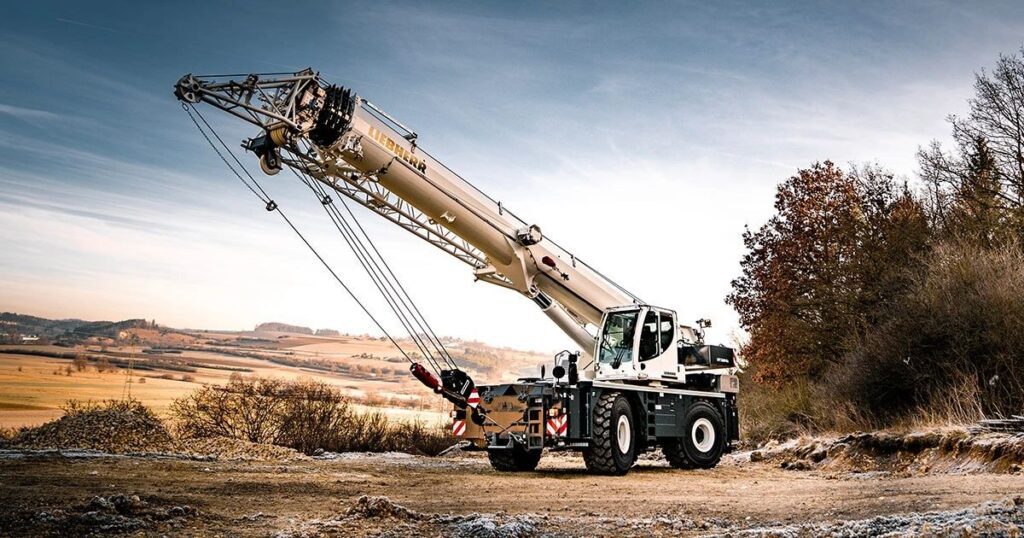
All-terrain cranes are highly versatile. They bridge the gap between a rough terrain crane and a more traditional truck-mounted unit. They can operate on both rough and smooth terrains, making them suitable for a wide range of job sites.
These cranes are typically mounted on a single axle, allowing them to operate in tight spaces. All-terrain cranes are perfect for tasks that require both road travel and rough terrain capabilities.
How All-Terrain Cranes are Often Used:
- Large-scale construction
- Mining operations
- Pipeline construction
- Road and bridge repair
- Lifting heavy materials in remote locations
6. Boom Trucks (Truck-Mounted Cranes)
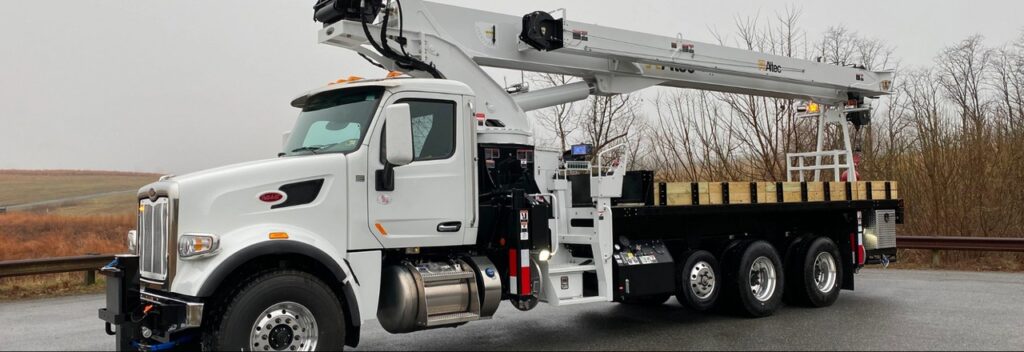
Boom trucks are a type of crane that is mounted on the back of a truck. With their inherent mobility and versatility, they can access challenging locations and effortlessly manage heavy loads.
Mounted on transport vehicles, these cranes are a popular choice in numerous industries, including construction, utility services, and transportation. Their truck-mounted crane design ensures both mobility and lifting prowess, catering to diverse job requirements.
Typical Jobs for Boom Trucks:
- Delivering building materials to construction sites
- Unloading and loading heavy goods
- Moving heavy equipment in confined spaces
- Residential construction tasks, such as setting trusses
7. Jib Cranes
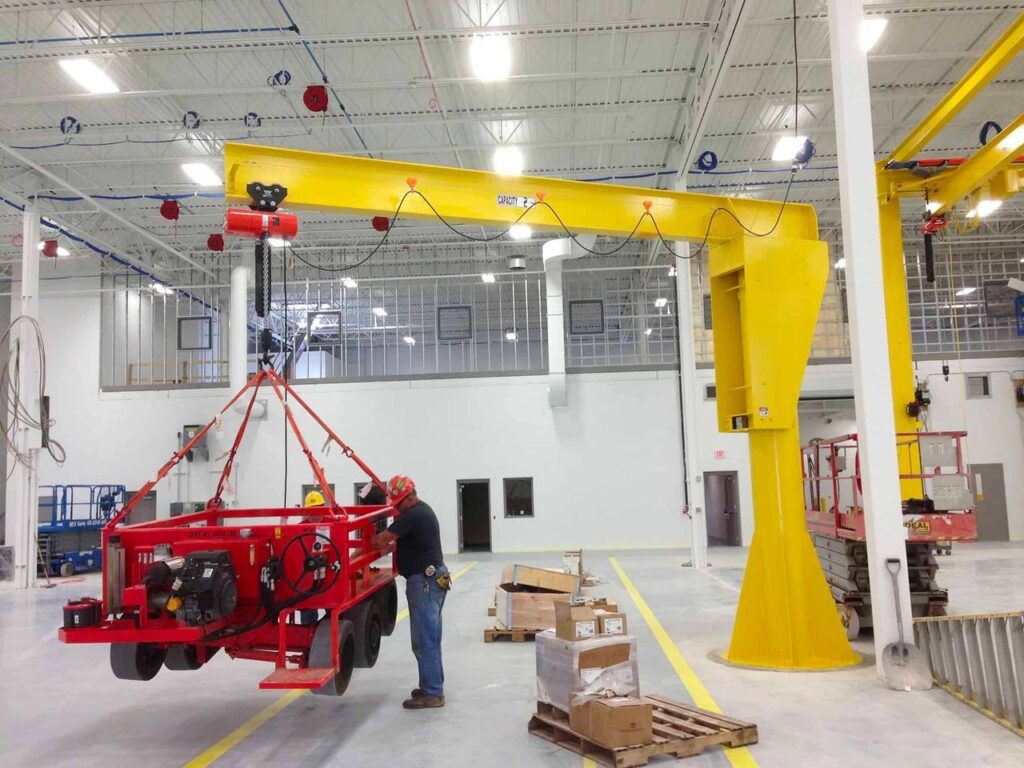
Jib cranes have a horizontal arm, called a jib, that supports and rotates the boom or the lifting mechanism. These cranes are typically stationary units often mounted to walls or columns. This gives them added stability.
A jib crane can lift up to several tons of weight, making them ideal for small-scale tasks that require accurate and precise movements.
Jobs Where Jib Cranes are Most Commonly Used:
- Machine shops
- Loading docks
- Warehouses
- Manufacturing settings
- Assembly lines/production areas
8. Overhead Cranes
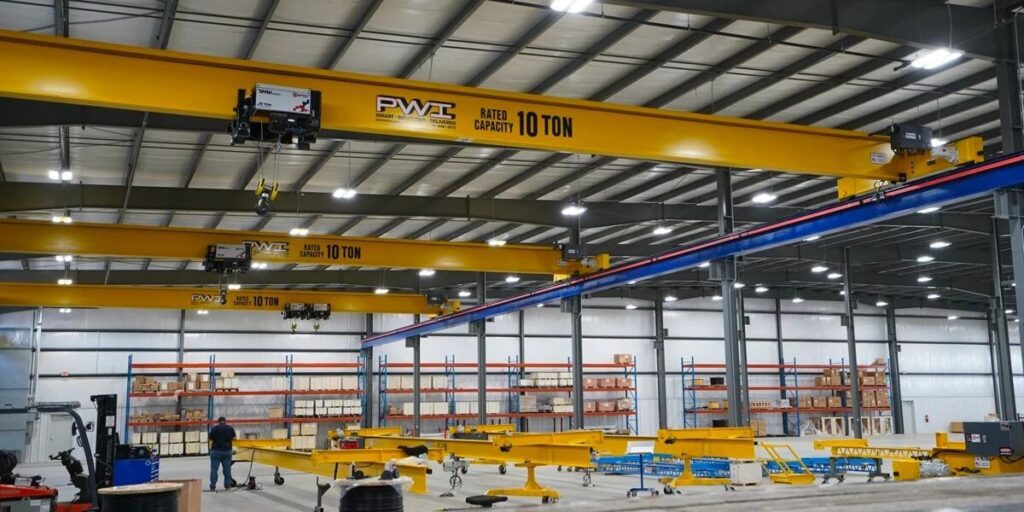
Overhead cranes are commonly used in industrial settings for moving heavy materials in a straight line. They consist of one or more horizontal girders known as the bridge. These girders run parallel to each other and support a hoist or trolley. They can move horizontally along the length of the bridge.
Overhead cranes are highly versatile. They can handle substantial weight over long distances, making them a popular choice for industrial applications.
Jobs That Would be in Need of Overhead Cranes:
- Moving heavy materials in factories or warehouses
- Shipbuilding yards and heavy fabrication tasks
- Manufacturing processes, especially in automotive or heavy industries
- Supporting mining and excavation operations
- Aiding in steel mill production processes
9. Deck Cranes
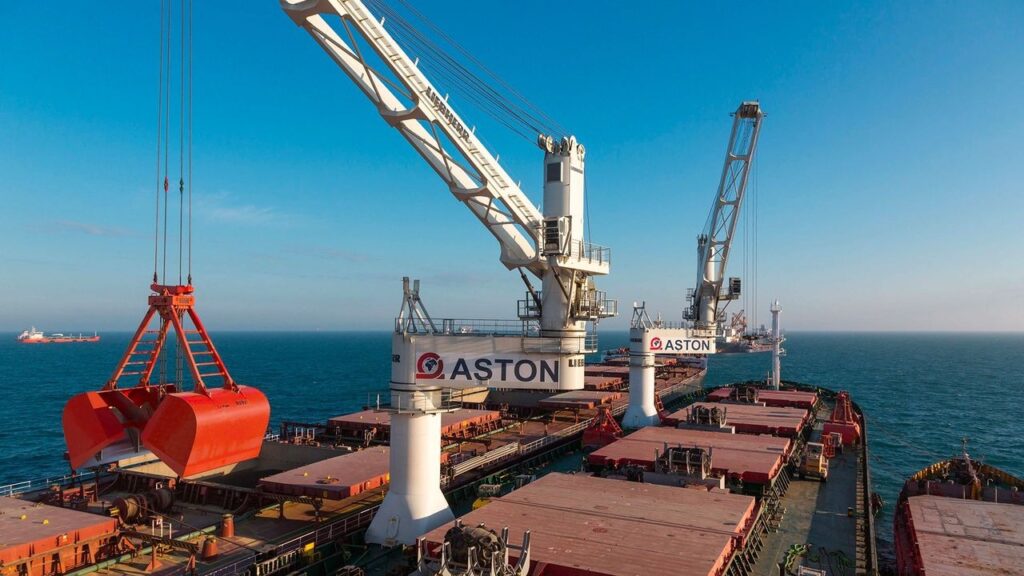
Deck cranes are specialized cranes used on ships and offshore drilling rigs. They are designed to handle heavy loads, containers, or equipment from a vessel’s deck. A deck crane comes in various types and sizes, depending on the specific needs of the ship or rig.
These deck cranes are essential for efficient and safe cargo handling during sea voyages, making them an integral part of the shipping industry.
Typical Uses of a Deck Crane for Specific Jobs:
- Shipping ports
- Offshore oil rigs
- Military ships equipment
- Dockside equipment
- Marine construction
- Salvage operation
Factors to Consider when Renting out a Crane
When renting a crane, whether it’s a crawler crane, floating crane, truck-mounted crane, or any other type, it’s important to consider several factors. These include the weight and size of the load, the terrain of the worksite, and any height restrictions.
Several key factors need to be considered to ensure you choose the right equipment for your specific job. This is crucial as it not only affects the efficiency and success of your project but also the safety of your workers.
Load Bearing Capacity
Cranes are designed for loading and unloading heavy objects. It is crucial to consider the weight of your load and ensure that the crane you choose has an adequate load-bearing capacity. If your load is too heavy for the crane, it can lead to accidents and damage to the equipment and the surrounding area.
Terrain on Construction Sites
The terrain of your worksite also plays a significant role in determining which crane type is best for the job. Rough or uneven terrain may require a different crane than a flat and stable surface. For example, rough terrain cranes are specifically designed for use on unstable ground and can handle various slopes and inclines.
Height Restrictions in Industrial Environments
It’s essential to consider any height restrictions on your worksite when selecting a crane. If you’re working in an area with low overhead clearance, a crawler crane or floating crane may be more suitable than a tower crane. Overhead cranes are a popular choice for indoor construction projects with limited space.
Duration of the Project
If you’re working on short-term construction projects, you might consider renting a mobile crane that can be easily set up and taken down. For long-term projects, especially in stable environments, a tower crane might be the most cost-effective option. Therefore, understanding the project’s timeline is essential in making an informed decision when choosing the most suitable crane for your needs.
Renter Company Conditions and Contract Rates
Another crucial factor to consider is the rental company’s conditions and contract rates. Some companies may only rent out specific crane models or have different pricing structures for various types of cranes. It’s essential to do your research and compare prices to ensure you’re getting the best deal.
Frequently Asked Questions Regarding Types of Cranes
Q: What are the different types of cranes?
- Tower cranes
- Mobile cranes
- Terrain cranes
- Truck-mounted cranes
- Jib cranes
- Overhead cranes
- Deck cranes
Each of these crane types has its unique features and uses for various purposes.
Q: Which types of cranes are best for my construction project?
The type of crane you choose for your construction project depends on various factors, such as the weight and size of the load, terrain, height restrictions, and duration of the project. It’s best to consult with a professional crane rental company to determine the most suitable option for your specific needs.
Q: Which crane type is known as a conventional crane?
A tower crane is considered a conventional crane due to its frequent use and ability to handle significant weight loads to great heights. It’s often seen on large building sites and can handle loads up to 20 tons or more.
Q: What is the difference between a crawler crane and a mobile crane?
A crawler crane has tracks or crawlers that allow it to move on rough or uneven terrain, making it ideal for outdoor use. On the other hand, a mobile crane is mounted on wheels and can be easily transported to different job sites.
Choosing the Ideal Variety of Cranes Suitable for Your Project
Understanding the different types of cranes available is crucial when deciding which crane best suits the task at hand. Each type of crane has its unique capabilities, making it suitable for specific jobs. By considering factors such as load-bearing capacity, terrain, height restrictions, and rental rates, you can ensure that you choose the ideal crane for your project. It’s always best to consult with a professional crane rental company to ensure the safe and efficient use of the equipment on your worksite.
So next time you have a construction project or heavy lifting job at hand, remember to assess your needs and contact us for expert advice on the best crane rental options for your project.
